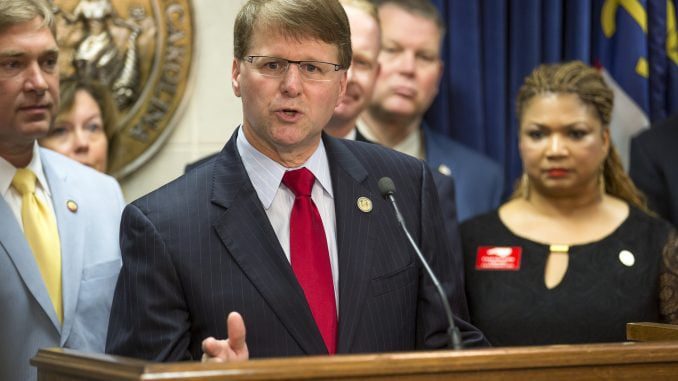
RALEIGH — In a rare united front, the state judicial branch and law enforcement community have joined forces to appeal for legislators to change laws that make North Carolina the only remaining state in the nation to try 16 and 17-year-olds as adults in criminal court.
North Carolina Supreme Court Chief Justice Mark Martin held a press conference at the General Assembly on Monday to endorse House Bill 280. Juvenile Justice Reinvestment Act. and was joined by the Police Benevolent Association, Chiefs of Police Association, and the NC Sheriffs’ Association – which had previously opposed the measure.
State education leaders including Superintendent Mark Johnson and Board of Education Chairman Bill Cobey, also joined in support.
“I know that young people – mine, yours – all across this state will make bad decisions, unfortunately,” said former Lt. Gov. Jim Gardner, a grandfather of nine that says he has seen plenty of mistakes made by young people while serving on the state’s Alcoholic Beverage Control Commission the last few years. “Simply because they make a mistake, it should not be with them for the rest of their lives.”
Currently, 16 and 17-year-olds in most counties in North Carolina are tried as adults for everything from a misdemeanor to a violent crime.
In addition to potential jail time at an adult facility, the conviction remains on their permanent record. Eleven counties, including Wake and Durham, have implemented local diversion programs that allow teen offenders rehabilitation alternatives to avoid a criminal record.
“When you have young people in 89 counties being treated one way, and then folks in another 11 counties being treated another way – we could call that unequal justice,” said Chief Justice Martin, “and that’s one of the gravest injustices in a legal system.”
In early April, New York passed a state budget compromise that included raising the age of criminal responsibility to 18. The new laws will be phased in over two years, and by October 2018 people under the age of 18 will also no longer be housed in adult jails and prisons.
This change left North Carolina as the only state in the nation to automatically prosecute and imprison 16 and 17-year-olds as adults, regardless of the crime.”
Unfortunately, North Carolina has become an outlier,” said Tom Murry, legal counsel for the N.C. judicial branch.
House Bill 280 would uniform the 100 counties in North Carolina and represents a series of recommendations that came from a 65-member task force charged with improving the justice system’s response to children and teenagers.
Central to these recommendations was treating 16 and 17-year-olds as juveniles, except for in cases of violent crimes.
In 2014, 96.7 percent of the convictions of 16 and 17-year-olds in North Carolina were for misdemeanors and non-violent felonies.
In addition, an Elon University poll released on Tuesday showed strong public support for the criminal justice reform. Among voters, 55 percent say the age should be raised from 16 to 18, while 37 percent oppose the move.
Raise the age has come up in recent years past, but concerns about cost have stalled previous legislation from becoming law.
“It’s going to take money…I want to make sure everyone knows that,” Wake County Sheriff Donnie Harrison said at the press conference Monday.
This is the first year that the law enforcement community has backed raise the age legislation.
The changes would require upfront capital, including a new detention center, juvenile-only cells in counties that currently house youth with adults, and more juvenile counselors and Assistant District Attorneys. But Harrison said, “this is something we can do.”
A fiscal note for House Bill 280 is not available yet, but Rep. Duane Hall (D-Wake) says that groups like Civitas and the John Locke Foundation have estimated that raise the age could save North Carolina $50 million a year. Hall, who has spent much of his career as an attorney involved in juvenile defense, has been a primary sponsor of raise the age legislation in the state legislature since 2013.
Hall says that while the evidence to support the change has been there for a long time, concerns about the upfront cost to taxpayers has left North Carolina as the last state standing.
“I felt like some people weren’t looking at the long-term goals,” said Hall. “Every other state that has implemented this has saved money in the long run, once it gets up and going.”
Hall and other supporters say the main reason states save money in the long term is because raising the age reduces recidivism: juvenile centers are focused on rehabilitation; kids get direct help and are not exposed to adult crime networks.
Judge Bill Webb, who chaired the Criminal Justice Reform Committee set up by Chief Justice Martin, said that the evidence-based recommendations were “so tightly reasoned” that we were able to gain more widespread support this year. Hall hopes that it will make a big difference having all the stakeholders onboard this time.
Reuters News Service and Elon University contributed to this article.



